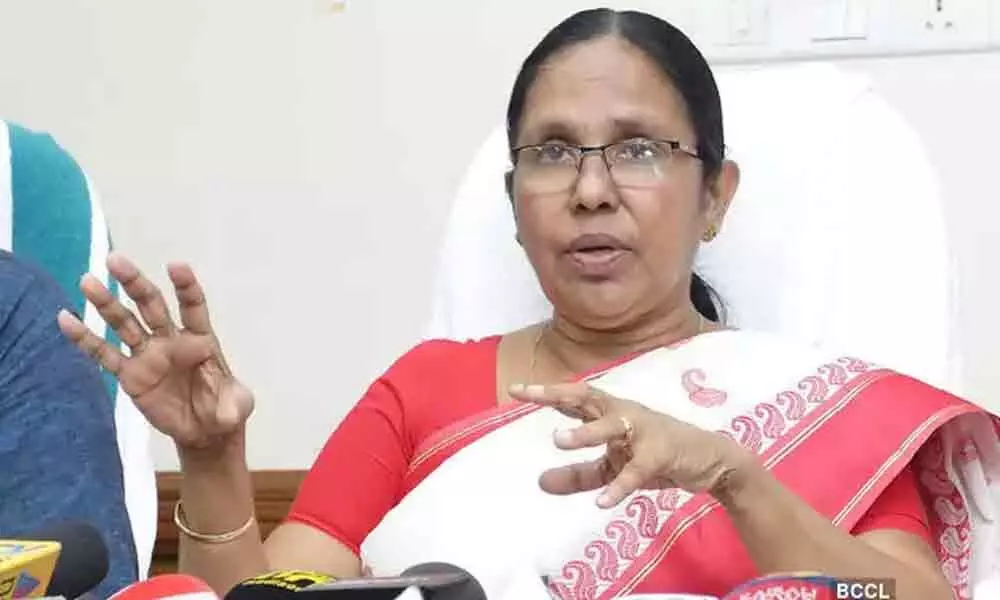Live
- Assam CM meets Governor, cabinet expansion on the cards
- IPL 2025 Auction: RCB buy Jacob Bethell for Rs 2.6 cr; Ellis sold to CSK for Rs 2 crore
- Commercial coal mines register highest-ever single day dispatches at 0.62 million tonnes
- More German companies adopting AI applications: statistics
- NASA Issues Warning About 170-Foot Asteroid Heading Towards Earth at 47,644 KM/H
- One killed, three injured in cargo plane crash near Vilnius airport
- PM Modi opens global cooperative meet, launches UN International Year of Cooperatives 2025
- 17 missing after safari boat sinks in Egypt's Marsa Alam
- Cyberabad Police Arrest Two for ₹48 Crore Fraud in Pre-Launch Property Offers Scam
- Utpanna Ekadashi 2024: Date, Rituals, Significance, and Mantras
Just In
No third stage spread or community transmission in Kerala so far: Health minister


There has been no third stage spread or community transmission of COVID-19 infection so far in Kerala, but there is need to exercise vigil, Health minister K K Shailaja, said.
THIRUVANANTHAPURAM: There has been no third stage spread or community transmission of COVID-19 infection so far in Kerala, but there is need to exercise vigil, Health minister K K Shailaja, said.
There is no third stage spread as of now because all those who have been infected with the virus lately have some or the other kind of contact with the affected, the minister told reporters here.
"We have not identified the exact contact in certain cases, but there are certain suspected points," she said.
"Community spread is the infection of the virus in a community as whole.We have been conductingrandom testing.We got a nurse infected with the virus in a random testing conducted at hospitals.
There is sentinel surveillance, random testing and all this is being done to check the community spread and it has been found that as of now there is no community spread," she said.
The peripheral hospitals like Taluk hospitals, and others were also being monitored to find out if there has been any increase in respiratory infections and pneumonia cases.
"We are checking whether there is any rise in respiratory-related cases or pneumonia.As of now, there are no such reports suggesting that such cases have increased.
This monitoring will continue and in case there is any rise in such cases we will focus on that area.So as of now, there is no community spread.But we cannot be sure that it won't happen."
Giving the example of Singapore, she said everything looked fine from January 23 to March 23 as they had only 500 casesbut after the lockdown was lifted theyare around 15,000 cases.
There is need to be extremely careful in the coming months else it would result in community spread,she said.
She asserted that testing was being done in a systematic manner- those who have been exposed to the virus and have symptoms were being tested first followed by those who did not show any symptoms, but had come from high risk areas.
Priority is then being given to sentinel surveillance to understand whether there is any presence in the community and people who have no travel history and symptoms are being tested.
But still to rule out the spead in the community, random testing has also been done, she said.
Asked about the lack of enough test kits, the minister said Kerala had more PCR test kits than Maharashtra, which has tested the most number of people.
Maharashtra has conducted the highest number of tests - both PCR and rapid combined.
Though Kerala was ready for rapid tests, it was found that the kits were faulty and the Centre was informed.
The Indian Council of Medical Research (ICMR) conducted a validation and found that there was fault with the test kits.
Many positive samples were shown as negative in those kits,she said.
Asked about the huge increase in the people registering at NORKA website for returning to the state, she said bringing everyone was not practical and they will be brought back as per priority.
On allegations that more health workers were getting infected as proper safety precautions were not being followed, she said if a single health worker is infected, the health department would provide all facilities and treat them in isolation and cure them before sending them home.
"We have asked everyone to take necessary precautions and the department will also monitorwhether every health worker is following the protocol on using masks, social distancingand all.
We will take care of the health workers because they are the ones who have to take care of the patients," she said.
There are many small clinicsin rural areas and instructions havebeen given to doctors and nurses there to take proper precautions including using masks and gloves before treating those who reach there for normal treatment, the minister added.

© 2024 Hyderabad Media House Limited/The Hans India. All rights reserved. Powered by hocalwire.com






